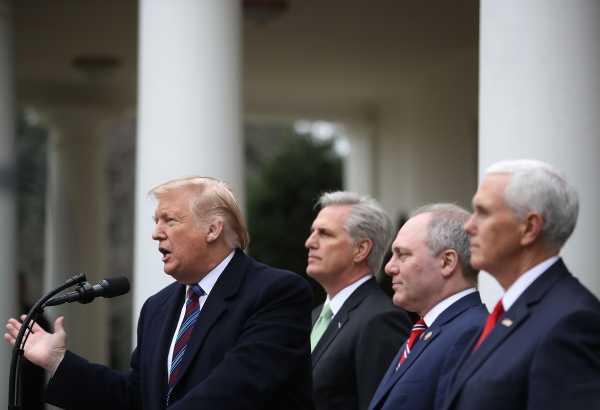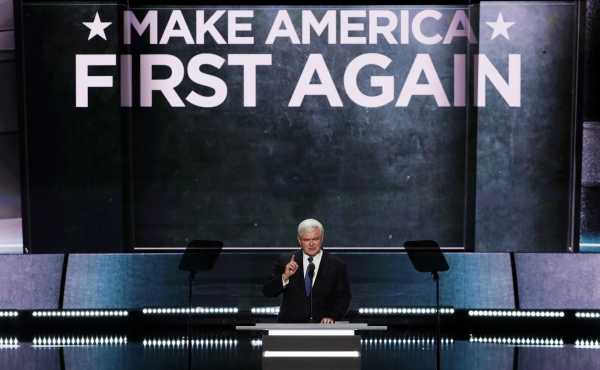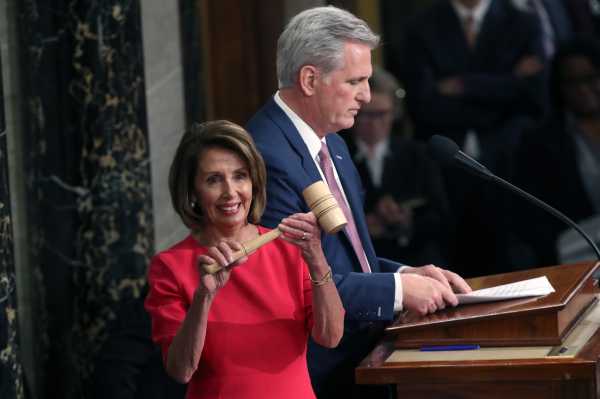
Republican Rep. David Schweikert has been walking around the Capitol Building with a binder on future of health care.
“Picture this: an autonomous health care clinic,” said the Arizona Congress member, visibly excited. “You walk in and sign in on an iPad. You sit down, the avatar on the screen — you pick up the thing — and it tells you turn it to the left, turn it to the right, shine it in your nose, your throat, your eye, put your hand on this, measure your pulse. Eventually we will be able to prick your finger and do a blood test right there.”
“That’s a revolution in the cost of delivery,” he continued. “But right now government has a lot of barriers — saying you can’t get a diagnosis from an algorithm. Those things will have to change.”
Schweikert represents something of a rarity among Republicans these days. He is doing what members of a minority party usually do: develop pie-in-the-sky ideas, without going through the painstaking process of making laws. But Republicans — who lost their midterm elections by the widest margins since Watergate — more or less shrug when asked to describe their vision for America.
“I don’t know there is an equivalent to Medicare-for-all,” said Rep. Mark Meadows (R-NC) the conservative chair of the House Freedom Caucus, who sits ideologically close to President Donald Trump. “The communication strategy for our vision for America is really still yet to be determined.”
Democrats have plenty of ideas, perhaps best encapsulated by the Green New Deal — an audacious, albeit amorphous, proposal that includes universal basic income ideas, a job-guarantee program, and a serious push to address climate change.
Meanwhile, Republicans, who still hold the White House and the Senate, appear stuck on what the vision they want to present the American public with is. They have Trump. And so far Trump’s biggest and boldest policy idea — a wall — gave them the longest government shutdown in US history.
“There is no message because it’s focused on the stupid government shutdown,” Rep. Adam Kinzinger (R-IL) said during the height of the spending fight. “And so it’s trying to find a way out of this — and that includes ‘Build a Wall’ and stuff — but I think hopefully we see more different [ideas], when we get passed this crisis. I’m tired of crises.”
There’s no new Contract With America or Better Way agenda

Republicans have struggled to define themselves behind a cohesive policy agenda under Trump. The “Make America Great Again” slogan is a far cry from Newt Gingrich’s “Contract with America” — the 1994 conservative manifesto that outlined a balanced budget, tax cuts and welfare reform, which swept Republicans into a House majority for the first time in 40 years, and kept them there for more than a decade.
Then came former House Speaker Paul Ryan’s “Better Way” agenda, which outlined privatizing Social Security and Medicare, shrinking the national debt, and enabling free-market health care, as well as deep cuts to the social safety net. That too feels like a distant memory. Repealing and replacing Obamacare was a flop. The national debt has grown. And Trump has drawn red lines around Social Security and Medicare — the two entitlement programs conservatives see as the only path to cutting the deficit. Trump remains singularly focused on his hardline anti-immigration agenda, which many Republicans don’t want to sign on to.
In two years, Republicans have cut taxes and pushed forward a deregulatory agenda that’s targeted energy, national parks, clean water, and — with the help of Democrats — banks. They helped usher through a significant criminal justice reform bill, which ironically ran counter to Trump’s “tough on crime” rhetoric and saw little play from Republicans on the campaign trail.
Instead, their official message in 2018 — the “Better Off Now” campaign — embodied Republicans’ biggest messaging problem: They had far fewer accomplishments than they’d promised, and it proved difficult to convince voters that a massive corporate tax cut was actually changing their lives.
Republicans wound up following Trump on a nationwide campaign about migrant caravans, MS-13 gangs, Confederate statues, and sanctuary cities. By Election Day, Republicans’ tax cuts were largely forgotten on the campaign trail — and the culture war back-up plan wasn’t enough to stop the bleeding.
“In terms of a comprehensive overall strategy, there’s not anyone that’s really delivering that at this point,” Meadows said. “There are a number of us that have ideas but I don’t know that the conference has embraced a big bold agenda.”
Meadows began listing issues he’d like to see prioritized: health care delivery systems and workforce training. He didn’t have an elevator pitch ready for either.
“We’re working on [the GOP message],” said first-term Rep. Dan Crenshaw (R-TX), who has become Republicans’ new celebrity millennial. “If the question is have we done it yet, I don’t think so. I think we do need some reinvention.”
Republican lawmakers are scheduled to go on their annual retreat in early February — a multi-day excursion to build party unity, talk policy, and set a clear agenda. So far there’s no party platform to speak of, just a lot of lawmakers like Schweikert who see an opening.
“For every shrug you get, that’s an opportunity for us who are policy freaks to influence,” he said.
Republicans see their main job as pushing back against Democrats

In the run-up to 2018 elections, Newt Gingrich — the architect of the Contract With America platform — explained how he thought Republicans could keep power in the House. He suggested they adopt “a big choice alternative universe campaign”: Paycheck Republicans vs. Food Stamp Democrats, Legal Immigration vs. No Borders, Health and Prosperity vs. Bankruptcy and Bureaucracy, and so on.
“With President Trump, Vice President Pence, and the entire Republican and conservative system driving home the message about how dangerous, destructive, and extreme the Democrats’ policies and values are, the 2018 election could become a referendum on the Left, rather than a referendum on the President,” Gingrich wrote. “If this happens, the Democrats will get annihilated.”
Among the Republican members, there’s a contingent now dedicated to following this strategy.
Crenshaw, when asked if Republicans had a Green New Deal-style ideas platform, responded with: “When you are a progressive, radical change is always next on the list, that’s the nature of it. There’s not really a philosophy associated with that. Radical change for the sake of radical change is generally ill-thought out.”
But while Republicans can agree they will be pushing back against Democrats, it’s not a strategy necessarily centered around policy, like Gingrich advised.
Republicans are staring down what will likely be two years of a Democratic inquisition on every aspect of the Trump administration, from his 2016 campaign, to the Department of Homeland Security’s handling of migrant children at the border.
Republicans have a president to protect.
Trump is going to drown out the message
Republicans still lament Trump’s ability to dominate whatever they were trying to do.
“I think the difficulty we always had was that you can put out whatever press release or messaging you want but a tweet derails that message for the day,” Kinzinger said. “We can put out the best message we want and a rally or a tweet changes that.”
On a certain level, Republican leaders recognize the liability. They just aren’t changing their tune. After all, the House’s slimmed-down Republican conference is significantly more conservative and unmoved by Trump’s whims.
“You’re definitely impacted, but you don’t rise or fall based on the executive,” Rep. Tom Emmer (R-OH), the new chair of House Republicans’ official 2020 campaign arm told the National Journal about Republican’s strategy going into 2020. “You get to run your own race, but I think this is a customer-service business. You have to have your own independent brand.”
But ask the lawmakers who lost in 2018, and they’ll tell you the opposite.
“Donald Trump is about Donald Trump, and what Donald Trump is, is he wants to be the center of attention every single day,” Rep. Mike Coffman (R-CO) said after losing his suburban district outside Denver. “He wants to dominate the news cycle every single day, and good luck trying to get a message out of that.”
Retired Pennsylvania House Republican Ryan Costello, who didn’t run for reelection in his increasingly Democratic suburban district in 2018, said the only way forward is to develop a clear agenda.
Having Ryan’s “Better Way” was key to getting him through the 2016 elections, he said.
“In 2016, what Paul Ryan did with the Better Way agenda was extremely important and proved to be crucial for candidates,” Costello said. “When Trump was doing his stuff I was talking about a Better Way. They would be well advised to do that.”
Sourse: vox.com






